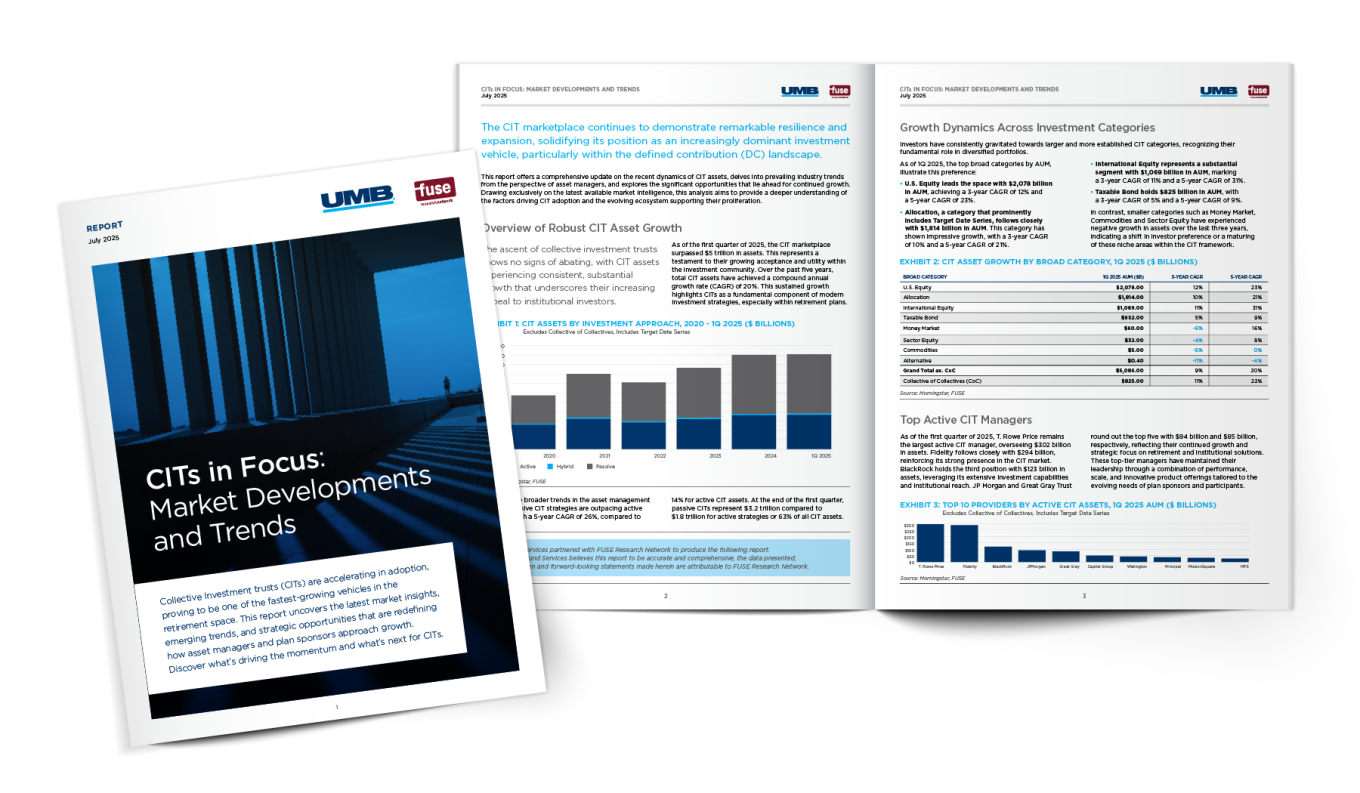Collective Investment Trust Services
Manage retirement plan assets in a cost-effective collective investment trust.
Collective Investment Trusts (CITs) remain a popular choice with advisers because of the lower marketing and distribution costs and fewer legal, administrative, and regulatory obligations as compared to other vehicles. Whether you’re launching a new strategy as a CIT or converting an existing fund to a CIT, UMB has the infrastructure and skills to support you.
Experience, service and support
Benefit from our team’s technical experience, our state-of-the-art systems and our commitment to outstanding client service and allow us to build a solution customized to your needs.
Unified back-office support
We handle the behind-the-scenes functions, from fund accounting, administration, trustee, transfer agency, and custody* services to regulatory compliance and tax reporting, so you can focus on serving your clients.
Strength and stability
With UMB, you receive the benefits of a large financial institution paired with our nimble, single-point-of-contact service approach.

Connect with our experienced fund administration team today
Key services to support your collective investment trust
Benefits of a collective investment trust
-

Interval and tender-offer fund distribution strategies
Read NowInterval funds and tender-offer funds have continued to raise assets at a rapid clip. As of June 30, 2025, we serve more than 46% of the unlisted closed-end fund market, and because of this, we are regularly involved in product...
-

Why private equity leaders are moving to outsourced fund administration
Read NowIn response to increasing interest from institutional investors and retail investors, more private equity fund managers are opening their minds to the proposition of outsourcing fund administration. Doing so responds to calls from investors and pressures on internal operations. Both...
-

Launching a private fund with plans to convert to a registered fund
Read NowLaunching a private fund is a fairly streamlined process compared to launching a registered fund, in part because there’s no need to wait for the Securities Exchange Commission (SEC) to complete its review and for its approval to become effective...
-

Why do most mutual funds make year-end distributions in December?
Read NowAs year-end approaches, you may see financial news stories suggesting investors can be wary of making new investments in mutual funds with upcoming year-end distributions. Here, we’ll cover why that may be good advice—and why mutual funds make year-end distributions...
-

Defend against business email compromise fraud
Read NowSafeguarding our clients’ assets is critical to our work at UMB. Our teams have seen a rise in fraud attempts—particularly of a type called business email compromise (BEC). BEC is a type of phishing attempt in which the objective is...
Collective Investment Trusts in Focus: Market Developments and Trends
Collective Investment Trusts (CITs) are accelerating in adoption, proving to be one of the fastest-growing vehicles in the retirement space. This report uncovers the latest market insights, emerging trends, and strategic opportunities that are redefining how asset managers and plan sponsors approach growth. Discover what’s driving the momentum and what’s next for CITs.

*Custody services provided by UMB Bank, n.a.